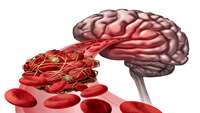Lab-grown tumor models could lead to improved ovarian cancer treatments
Scientists have created a three-dimensional (3-D) tumor model in the laboratory for ovarian cancer that could lead to improved understanding and treatment of the disease.
Stem cell-derived extracellular vesicles may alleviate brain bleeding, preclinical study shows
A preclinical study conducted by researchers at Sungkyunkwan University (Seoul, South Korea) has indicated that extracellular vesicles (EVs) derived from mesenchymal stem cells (MSCs) could alleviate intraventricular hemorrhage (IVH) damage – a devastating condition that commonly affects premature babies.
Amniotic fluid may yield new, better treatment for ischemic stroke
A study released today in STEM CELLS Translational Medicine points the way to a possible new avenue of treatment for ischemic stroke.
A bandage with magnetic nanofibres that kills skin cancer cells with heat
Researchers from the Indian Institute of Science (IISc) have developed a non-invasive bandage made with magnetic nanofibres to treat skin cancer by administering heat to the tumor cells.
New way to deliver DNA-based therapies for diseases
University of Minnesota Twin Cities researchers in the Department of Chemistry have created a new polymer to deliver DNA and RNA-based therapies for diseases.
Gene therapy for placental insufficiency moves toward the clinic
A new study identified an adenovirus gene therapy vector carrying a VEGF isoform. It can improve uterine blood flow in placental insufficiency, as reported in the peer-reviewed journalHuman Gene Therapy.
Neuroregenerative gene therapy
Spinal cord injury (SCI) often causes disability and seriously compromises quality of life. While decades of research have made significant progress in axonal regeneration after SCI, most of the interventions have not been translated into clinical therapies.
Self-assembled particle gel for promoting blood vessel formation
NIMS has developed a low-cost self-assembled particle-based injectable gel for promoting blood vessel formation—a regenerative medicine process vital in cell and tissue transplantation. This material may be used as an effective, low cost regenerative medicine technology and may serve as an alternative to expensive and deactivation-prone growth factors.
CRISPR CTX001 Clinical Trial: Promising Results in Sickle Cell Patients
Sickle cell anemia and beta-thalassemia are serious genetic blood disorders, caused by mutations in the gene that produces beta-globin, a component of hemoglobin.
Research dispels fears human stem cells contain cancer-causing mutations
Pioneering new research has made a pivotal breakthrough that dispel concerns that human stem cells could contain cancer-causing mutations.












